

Antipsychotic Drugs for Paranoia in Dementia. Paranoia in Dementia Dementia is a term used for diseases and conditionscaused by a decline in memory, language and thinking skills affecting a person’s ability to carry out day-to-day activities.
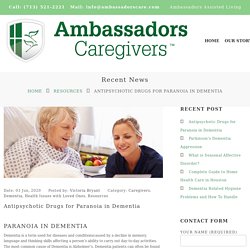
The most common cause of Dementia is Alzheimer’s. Dementia patients can often be found suffering from undesirable emotions such as fear, anger and jealousy. This sort of behavior spotted in Dementia patients is known in the field of medical science as Paranoia. Parkinson's Dementia Aggression - Ambassadors Caregivers. Parkinson’s Dementia Aggression is the aggression stemming from Parkinson’s disease Dementia that impairs thought processes, mental functions and memory.
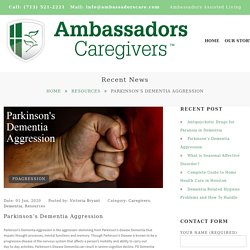
Though Parkinson’s Disease is known to be a progressive disease of the nervous system that affects a person’s mobility and ability to carry out day-to-day activities, Parkinson’s Disease Dementia can result in severe cognitive decline. PD Dementia reduces the ability of a person to live independently and affects his ability to understand spoken language, memory and concentration. Symptoms of Parkinson’s disease Dementia vary from anxiety to irritability and delusions, depression, difficulty in sleeping well, slurred speech, difficulty in absorbing and interpreting visual information, excessive daytime sleepiness and rapid eye movements, memory changes, paranoia and visual hallucinations.
Diagnosing PD Dementia can be very difficult at times, as there is no single test that can help identify the presence or type of dementia. What is Seasonal Affective Disorder? - Ambassadors Caregivers - Home Care. Are you a caregiver for seniors?
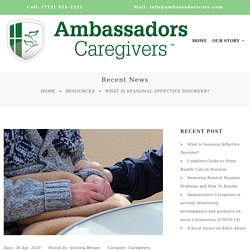
Do you feel that a few individuals whom you look after often become moody and melancholy during the winter? Don’t let this go unnoticed, they might be suffering from Seasonal Affective Disorder or SAD. Seasonal affective disorder is a form of depression that occurs the same time every year – usually around winter and late fall. It is also known as seasonal depression, SAD, or winter depression. Some might suffer from the rare summer depression, a type of seasonal depression beginning early summer or late spring, and ending in fall.
Ways to Communicate with Loved Ones - Ambassadors Caregivers. Effective communication is essential for the survival of a relationship, especially when it concerns your loved ones.
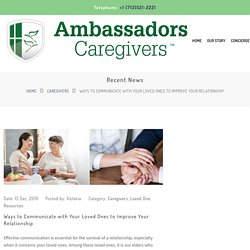
Among these loved ones, it is our elders who expect our best when it comes to communicating, as the slightest feeling of ignorance causes them great hurt. Communication gaps strain relations with elders with them feeling neglected and not adequately taken care of. With the passage of age and time, we have to find out new ways to communicate with our loved ones and this takes paramount importance especially for those essaying the roles of caregivers.
Home health care services are provided best by caregivers in a way in which seniors and residents feel that their dignity has been kept intact. Elders or loved ones must be listened to very carefully. Difference between Public and Private Health Care. What is difference between public health care and private health care?
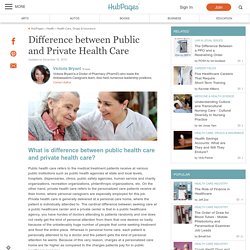
Public health care refers to the medical treatment patients receive at various public institutions such as public health agencies at state and local levels, hospitals, dispensaries, clinics, public safety agencies, human service and charity organizations, recreation organizations, philanthropic organizations, etc. On the other hand, private health care refers to the personalized care patients receive at their home, where personal caregivers are especially employed for this job. Private health care is generally delivered at a personal care home, where the patient is individually attended to. Now if one talks about private health care delivered at a personal care home or at some hospital or clinic running independently of the National Health Service (NHS), then the patient seeking the treatment has to pay for the charges or the fees payable as the NHS does not subsidize any of the costs for private healthcare.
Having THE TALK With Mom Or Dad - Ambassadors Care. Home Safety Evaluation Program for the Elders - Ambassadors Care. Caregivers Check In Program for Your Elders - Ambassadors Care. This caregiver check-in program is designed to be the eyes and ears for families who live far away or out of town.
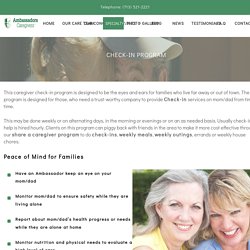
The program is designed for those, who need a trust-worthy company to provide Check-in services on mom/dad from time to time. This may be done weekly or on alternating days, in the morning or evenings or on an as needed basis. Usually check-in help is hired hourly. Clients on this program can piggy back with friends in the area to make it more cost effective through our share a caregiver program to do check-ins, weekly meals, weekly outings, errands or weekly house chores. Pros and Cons of Assisted Living Facility and Personal Care Home. When it comes to elderly care, Assisted Living and Personal Home Care are used interchangeably.
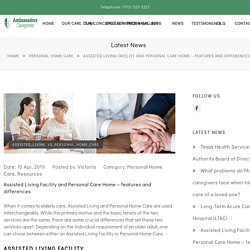
While the primary motive and the basic tenets of the two services are the same, there are some crucial differences that set these two services apart. Depending on the individual requirement of an older adult, one can chose between either an Assisted Living Facility or Personal Home Care. Assisted Living Facility Assisted Living Facilities provide an older adult who for the most part is mentally and physically able, a room which can be either shared or private, in a community or campus with other older adults. It’s a complete facility which has specifically designed activities for older adults and where their food, lodging and other facilities are paid for on a monthly basis.
Assisted Living Facilities all have tiered programs, ranging from Tier 1 to Tier 3. Tier 1- For those older adults who are completely able bodied and don’t need any special assistance to carry on their day to day routines. Assisted Living and Memory Care. There are many who fail to differentiate between the types of senior care that are available and basically club all of them together.
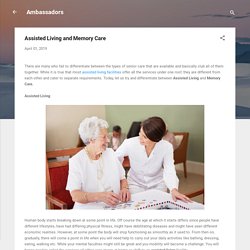
While it is true that most assisted living facilities offer all the services under one roof, they are different from each other and cater to separate requirements. Today, let us try and differentiate between Assisted Living and Memory Care. Assisted Living Human body starts breaking down at some point in life. Off course the age at which it starts differs since people have different lifestyles, have had differing physical fitness, might have debilitating diseases and might have seen different economic realities. Benefits of Senior Companionship Care. Ambassadors Care –Best personal home care services for senior living.